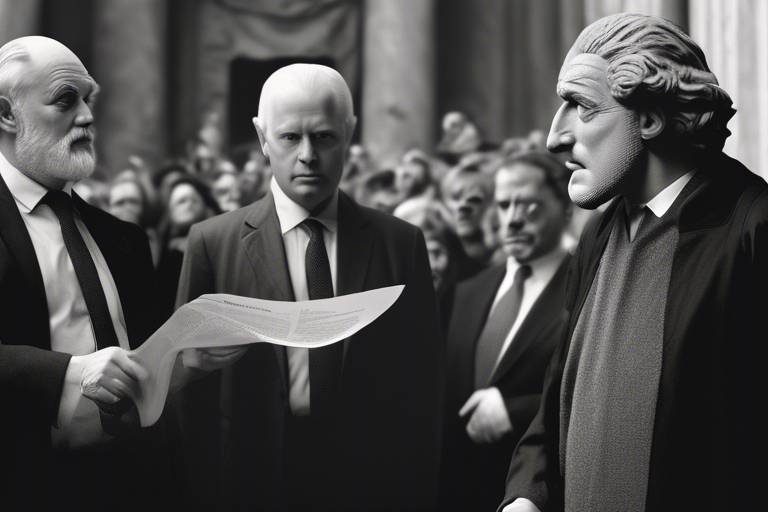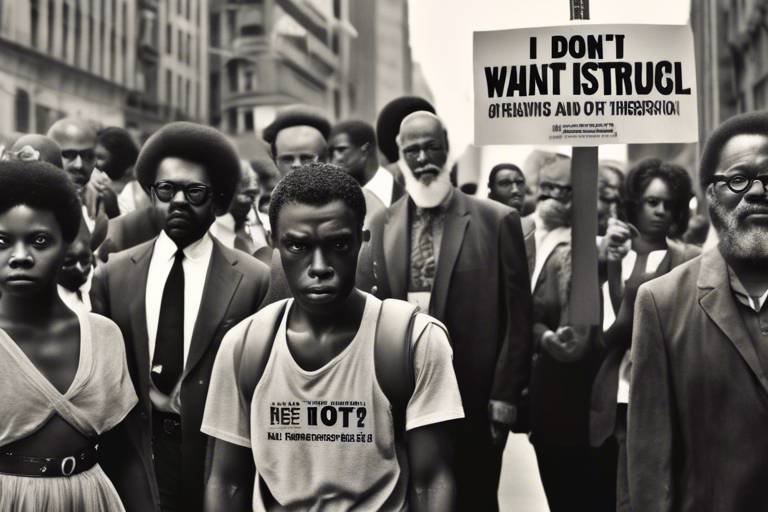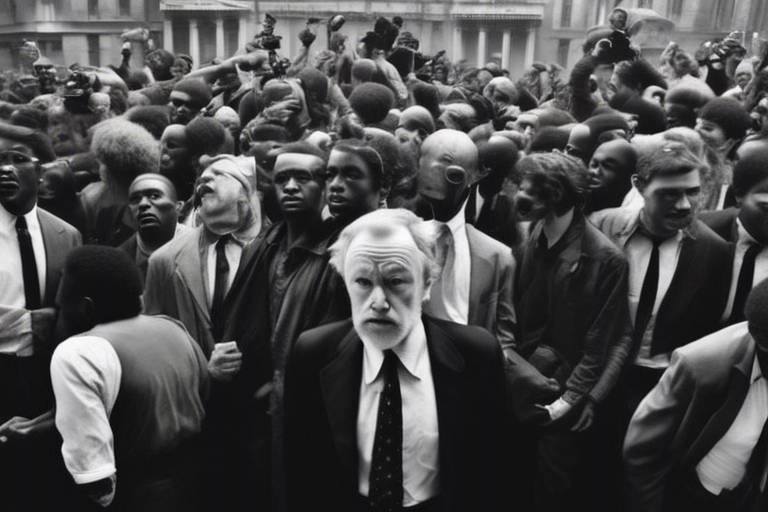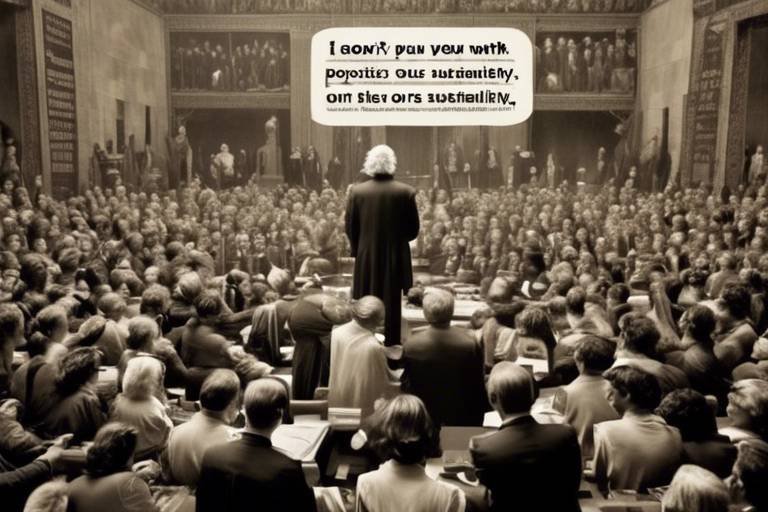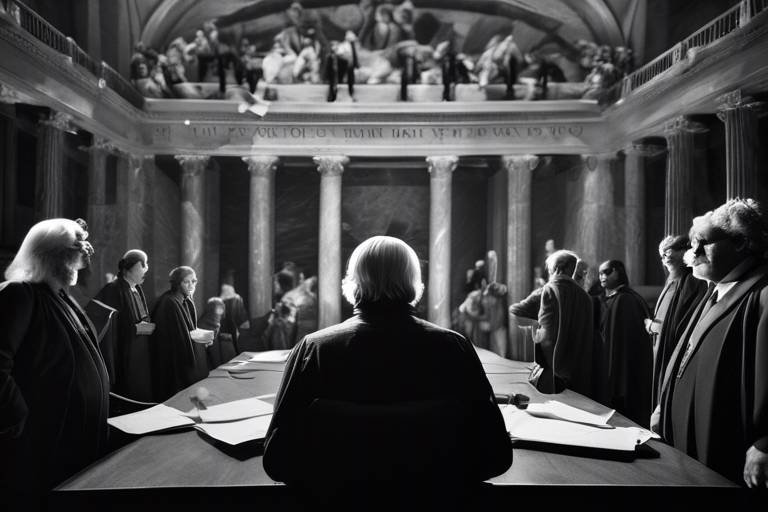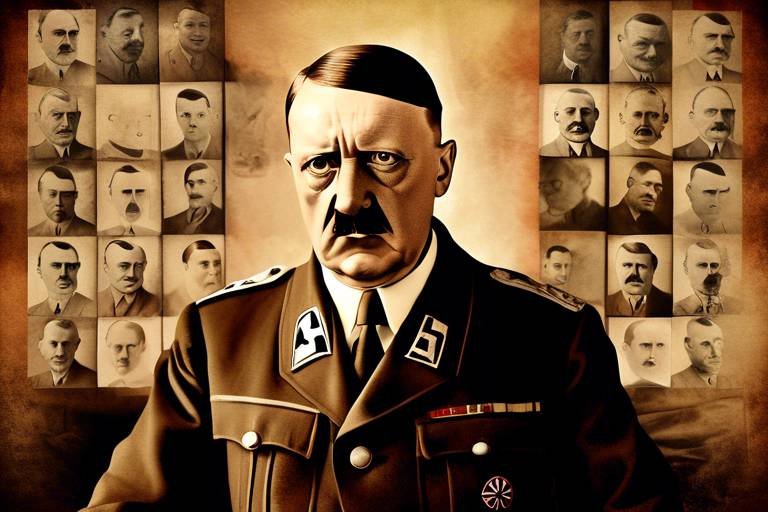Does Philosophy Shape Political Attitudes or Vice Versa?
Have you ever paused to think about the intricate dance between philosophy and politics? It's a relationship that's as old as civilization itself, where ideas and beliefs twist and turn, influencing each other in ways that can be surprising and profound. At the heart of this exploration lies a fundamental question: does our philosophical outlook shape our political attitudes, or do our political experiences mold our philosophical beliefs? This article unpacks this tantalizing interplay, examining how philosophical doctrines have historically influenced political ideologies and how, in turn, political contexts can reshape our thinking about philosophy.
To begin with, let's consider the very nature of philosophy. It serves as a lens through which we interpret the world, providing frameworks for understanding complex issues like justice, freedom, and governance. Think of philosophy as the foundation of a house; without a solid base, the structure above can easily crumble. This foundation influences our political attitudes, guiding how we perceive authority, rights, and the role of the state. For instance, a person who embraces utilitarianism might prioritize policies that promote the greatest good for the greatest number, while a follower of Kantian ethics might argue for the inviolability of individual rights, regardless of the consequences.
On the flip side, political contexts can dramatically alter philosophical thought. Historical events, social movements, and even cultural shifts can prompt a reevaluation of previously held beliefs. Imagine a philosopher in a time of political upheaval; their ideas might shift as they respond to the challenges and injustices around them. The tumult of the civil rights movement in the United States, for example, led many thinkers to reconsider their views on equality and justice, demonstrating how political climates can catalyze philosophical evolution.
In essence, this relationship is not one-sided but rather a dynamic interplay. Political theories often arise from philosophical inquiries, while real-world political situations can challenge and refine those theories. For instance, the rise of democratic ideals in the Enlightenment was fueled by the philosophical ideas of liberty and equality, but the actual practice of democracy has also led to philosophical debates about representation, power, and the common good.
So, as we delve deeper into this topic, we will explore historical perspectives, influential philosophers, and contemporary issues that highlight this fascinating relationship. By examining the roots of political thought and its philosophical underpinnings, we can gain a better understanding of how our beliefs shape our world, and vice versa. This journey will not only illuminate the past but also provide insight into the ongoing dialogues that continue to influence our political landscape today.
- What is the main relationship between philosophy and politics? Philosophy provides the foundational ideas that shape political ideologies, while political contexts can lead to new philosophical insights.
- Can you give an example of a philosopher who influenced politics? Yes, John Locke’s ideas on the social contract significantly shaped modern democratic principles.
- How do contemporary issues reflect philosophical debates? Current political issues often provoke discussions about ethics, rights, and governance, highlighting the ongoing relevance of philosophical thought.

The Interplay of Philosophy and Politics
When we think about philosophy and politics, it’s easy to imagine them as two separate realms. However, they are intricately intertwined, like two dancers in a complex ballet. Each influences the other in profound ways, shaping our understanding of governance, justice, and societal norms. At its core, philosophy provides the foundational ideas that inform political ideologies, while political contexts can challenge and reshape those very philosophies. This dynamic relationship is not just theoretical; it manifests in real-world scenarios that affect our lives daily.
Consider the way philosophical concepts such as liberty, equality, and justice have been interpreted through different political lenses over time. For instance, the Enlightenment period saw a surge in philosophical thought that emphasized the rights of the individual, which in turn led to revolutions and the formation of democratic governments. These ideas didn’t just float around in the ether; they were actively adopted and adapted by political leaders and movements, creating a feedback loop that continues today.
Furthermore, the interplay between philosophy and politics is not static. As political landscapes shift due to social movements, economic changes, or technological advancements, philosophical thought must also evolve. Take the rise of social media and its impact on political discourse, for example. Philosophers today are grappling with questions about free speech and censorship in a digital age, reflecting a need to reassess traditional philosophical ideas in light of new political realities.
To illustrate this interplay, let’s look at a few examples:
- Utilitarianism: This philosophical approach, which advocates for the greatest good for the greatest number, has influenced policies on social welfare and healthcare. Politicians often invoke utilitarian principles when justifying legislation that impacts public resources.
- Marxism: Emerging from philosophical critiques of capitalism, Marxism has not only shaped political movements but has also prompted philosophers to rethink concepts of class, power, and economic systems.
In essence, the relationship between philosophy and politics is like a conversation—one that is ongoing, dynamic, and often contentious. Philosophers provide the questions that challenge political norms, while politics offers the context that can either validate or refute those philosophical inquiries. It’s a continuous cycle where each discipline enriches the other, leading to a deeper understanding of the complexities of human society.
This interplay is crucial for anyone interested in the mechanisms of power and governance. Understanding how philosophical ideas shape political attitudes—and vice versa—can empower individuals to engage more critically with the world around them. It encourages us to ask: How do our beliefs influence our political choices? And how do the political climates we live in reshape our beliefs?

Historical Perspectives on Philosophy and Politics
The relationship between philosophy and politics is as old as civilization itself. Throughout history, philosophical ideas have not only shaped political thought but have also been profoundly influenced by the political contexts of their time. This intricate dance between the two realms has led to significant transformations in governance, rights, and societal structures. One can argue that philosophy provides the framework through which political ideologies are understood, while political realities often challenge and refine philosophical beliefs.
For instance, during the Enlightenment period, thinkers like Voltaire and Rousseau challenged the status quo of monarchies and advocated for reason, individualism, and democracy. Their ideas ignited revolutions across Europe and the Americas, demonstrating how philosophical thought can spur political action. In contrast, the political upheaval of the time also forced philosophers to reconsider their ideas, leading to new interpretations of liberty and justice.
A pivotal moment in history was the American Revolution, which was heavily influenced by the writings of John Locke and his theories on natural rights and government by consent. Locke's philosophy not only justified the rebellion against British rule but also laid the groundwork for the foundational principles of the United States Constitution. This illustrates how political contexts can serve as a catalyst for philosophical evolution, as Locke's ideas were reinterpreted to support the quest for independence and democratic governance.
Another significant example can be found in the works of Karl Marx, whose critiques of capitalism emerged from the socio-economic conditions of the 19th century. Marx's philosophy did not develop in a vacuum; rather, it was a response to the harsh realities faced by the working class during the Industrial Revolution. His ideas about class struggle and economic systems spurred political movements worldwide, leading to revolutions that sought to dismantle capitalist structures. This reciprocal relationship showcases how political environments can inspire philosophical inquiry and vice versa.
Moreover, the 20th century brought about monumental shifts in both philosophy and politics, particularly with the rise of totalitarian regimes. Philosophers like Hannah Arendt examined the nature of power and authority in the context of totalitarianism, reflecting on how political systems could corrupt human values. Her work not only critiqued the political landscape but also contributed to a broader understanding of human rights and the importance of civic engagement, demonstrating the continuing dialogue between philosophical thought and political realities.
In summary, the historical perspectives on philosophy and politics reveal a complex interplay where each influences the other. As political contexts evolve, they challenge existing philosophical frameworks, prompting new ideas and movements. Conversely, philosophical thought can inspire political change, leading to revolutions and reforms that reshape societies. This ongoing relationship is essential for understanding how we navigate the political landscape today.
- How does philosophy influence political ideologies?
Philosophy provides the foundational principles and ethical considerations that shape political ideologies, guiding how societies understand governance, rights, and justice. - Can political events change philosophical beliefs?
Yes, significant political events often prompt philosophers to reevaluate their ideas, leading to new interpretations that reflect the changing political landscape. - What role did Enlightenment thinkers play in shaping modern politics?
Enlightenment thinkers like Voltaire and Rousseau challenged traditional authority and advocated for democracy, individual rights, and reason, which influenced modern political systems. - How did Karl Marx's ideas affect political movements?
Marx's critique of capitalism and his theories on class struggle inspired various political movements aimed at establishing socialist and communist systems, particularly in the 20th century.

Influential Philosophers and Their Political Theories
Throughout history, certain thinkers have profoundly shaped the way we understand politics and governance. These influential philosophers have not only crafted theories that reflect their own times but have also laid the groundwork for modern political thought. Their ideas resonate through the ages, influencing everything from democratic principles to authoritarian regimes. Let’s take a closer look at a few key figures whose political theories have left a lasting impact.
One of the most significant philosophers in this realm is Plato. His vision of an ideal state, articulated in works like "The Republic," presents a society governed by philosopher-kings—wise rulers who possess the knowledge necessary to lead justly. Plato believed that a well-ordered society could only exist when the rulers are educated in philosophy and ethics, ensuring that they prioritize the common good over personal interests. This concept has sparked debates about the role of expertise in governance and has influenced modern discussions about meritocracy in political leadership.
Then we have Aristotle, a student of Plato, who took a more pragmatic approach to politics. In his work "Politics," Aristotle emphasized the importance of the middle class and advocated for a mixed government that combines elements of democracy, oligarchy, and monarchy. He argued that the best government is one that balances the interests of different social classes, which can prevent tyranny and promote stability. Aristotle’s ideas continue to inform contemporary discussions about political representation and the necessity of diverse voices in governance.
Another towering figure is John Locke, whose theories on the social contract and natural rights have profoundly influenced modern democratic thought. Locke posited that individuals possess inherent rights to life, liberty, and property, which governments must protect. His ideas laid the foundation for the concept of government by consent, suggesting that authority derives from the will of the governed. Locke's political philosophy has been instrumental in shaping the principles of liberal democracy and has had a lasting impact on documents such as the United States Declaration of Independence.
To illustrate the contributions of these philosophers, here’s a brief comparison of their key political theories:
| Philosopher | Key Work | Main Ideas |
|---|---|---|
| Plato | The Republic | Philosopher-kings, ideal state, the importance of education |
| Aristotle | Politics | Mixed government, importance of the middle class, balance of power |
| John Locke | Two Treatises of Government | Social contract, natural rights, government by consent |
These thinkers not only shaped their own eras but also provided frameworks that continue to influence political ideologies today. Their ideas invite us to reflect on essential questions about justice, governance, and the role of the individual within society. As we engage with their theories, we can better understand our own political attitudes and the philosophical underpinnings that inform them.
In conclusion, the interplay between philosophy and political theory is complex and multifaceted. The insights offered by philosophers like Plato, Aristotle, and Locke remain relevant as we navigate the challenges of modern governance. Their legacies encourage us to critically examine the structures of power and the ethical implications of our political choices.
- How do philosophical theories influence modern politics? Philosophical theories provide foundational ideas that shape political ideologies, guiding lawmakers and influencing public opinion.
- Who are some other influential political philosophers? Besides Plato, Aristotle, and Locke, philosophers like Rousseau, Hobbes, and Marx have also made significant contributions to political thought.
- Can political events change philosophical beliefs? Yes, significant political events often lead to reevaluations of philosophical beliefs, prompting new interpretations and ideas in political philosophy.
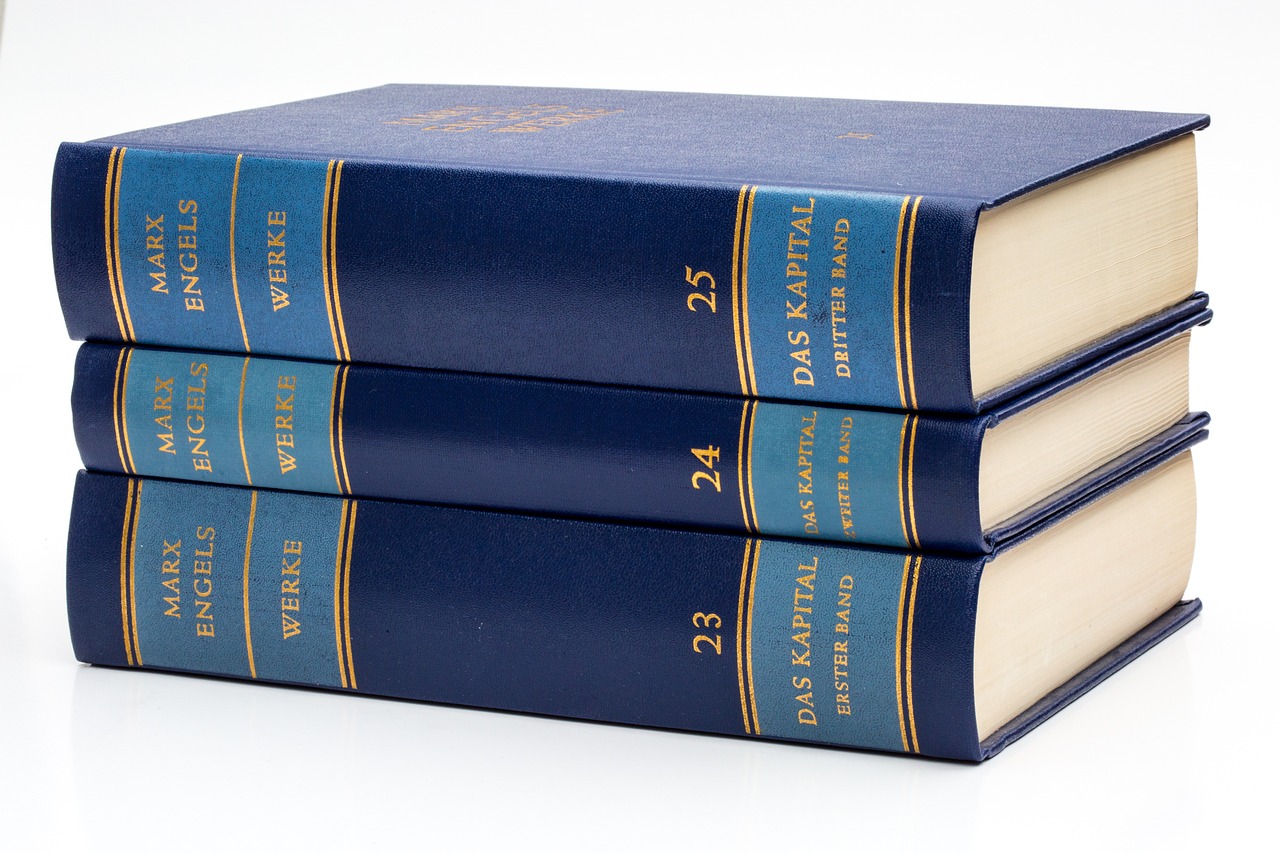
Plato's Ideal State
Plato, one of the most influential philosophers in Western thought, envisioned a society governed by reason and wisdom, which he articulated in his seminal work, "The Republic." In this ideal state, Plato proposed a tripartite structure of society, consisting of three distinct classes: the rulers (philosopher-kings), the guardians (warriors), and the producers (farmers and artisans). Each class had its own role and responsibilities, ensuring that the society functioned harmoniously. The philosopher-kings, equipped with knowledge and virtue, were deemed best suited to govern, as they could make decisions for the common good, free from the corruption of personal interests.
To better understand Plato's vision, it’s essential to recognize how he believed that the state should reflect the ideal of justice. He argued that justice occurs when each class performs its designated role without overstepping its boundaries. For Plato, the harmony achieved through this structure is akin to a well-tuned musical ensemble, where each instrument contributes to the overall symphony. This analogy illustrates how he viewed the interdependence of social classes, highlighting that a just society is one where everyone plays their part effectively.
Moreover, Plato's ideal state is not merely a theoretical construct; it serves as a critique of the political systems of his time, particularly the Athenian democracy, which he regarded as flawed due to its susceptibility to mob rule and emotional decision-making. He feared that untrained individuals would make poor choices, thereby jeopardizing the welfare of the state. This perspective raises the question: can we trust the masses to make informed decisions? Plato’s answer was a resounding no, advocating instead for a ruling class that is educated in philosophy and governance.
In practice, Plato’s ideas have sparked considerable debate throughout history. Many have lauded his vision of a society led by the wise, while others have criticized it as elitist and impractical. For instance, the concept of philosopher-kings has often been viewed as an unrealistic ideal, suggesting that those in power may not always possess the wisdom or virtue Plato envisioned. Nevertheless, his thoughts have profoundly influenced political theory and continue to resonate in discussions about governance and leadership today.
Ultimately, Plato's ideal state serves as a foundational concept in political philosophy, prompting us to reflect on the nature of justice, the role of the individual in society, and the qualities that leaders should possess. His vision challenges us to consider how philosophical principles can shape political structures and, conversely, how political realities can influence philosophical thought.
- What is Plato's ideal state? Plato's ideal state is a philosophical concept where society is structured into three classes: rulers, guardians, and producers, each fulfilling specific roles to achieve justice and harmony.
- Why did Plato prefer philosopher-kings? Plato believed that philosopher-kings, being educated in wisdom and virtue, would make informed decisions for the common good, avoiding the pitfalls of emotional and uninformed choices.
- How does Plato's ideal state critique democracy? Plato criticized democracy for its potential to devolve into mob rule, arguing that untrained individuals may make poor decisions that could harm society.
- What influence has Plato's ideal state had on modern political thought? Plato's ideas have inspired discussions about governance, justice, and the qualities of effective leaders, influencing various political theories throughout history.

Locke and the Social Contract
John Locke, one of the most influential philosophers of the Enlightenment, introduced the concept of the social contract, which fundamentally reshaped political thought. His ideas emerged during a time when monarchies dominated Europe, and his vision provided a refreshing alternative that emphasized individual rights and the role of government. Locke's social contract theory posits that individuals consent to form a government to protect their natural rights—namely, life, liberty, and property. This notion was revolutionary, as it challenged the divine right of kings and laid the groundwork for modern democracy.
At the heart of Locke's argument is the belief that governments derive their authority from the consent of the governed. This means that if a government fails to protect the rights of its citizens, those citizens have not only the right but the duty to overthrow it. This idea resonates strongly in contemporary political discourse, especially in discussions about civil disobedience and the legitimacy of authority. Locke's emphasis on individual rights and the responsibility of governments to uphold these rights has had a lasting impact, influencing both the American and French revolutions.
Locke's social contract is often summarized in three key principles:
- Natural Rights: Every individual possesses inherent rights that cannot be surrendered or transferred.
- Consent of the Governed: A legitimate government must be based on the consent of its citizens.
- Right to Revolt: Citizens have the right to overthrow a government that fails to protect their rights.
These principles not only shaped political thought during Locke's time but also continue to influence modern political systems around the world. For instance, the United States Declaration of Independence echoes Locke's ideas, asserting that governments are instituted to secure the unalienable rights of individuals. Similarly, many democratic constitutions around the globe reflect the fundamental belief in the social contract as a basis for governance.
In conclusion, Locke's social contract theory serves as a cornerstone of liberal political philosophy. It encourages a dialogue about the responsibilities of both the government and its citizens, fostering a more participatory approach to governance that still resonates today. The implications of his ideas are profound, as they challenge us to consider not just what we expect from our governments, but also what we owe to each other as members of a democratic society.
- What is the social contract theory? The social contract theory is a political philosophy that suggests individuals consent to form a government to protect their rights and maintain order.
- How did Locke influence modern democracy? Locke's ideas about natural rights and the consent of the governed laid the foundation for democratic principles, emphasizing individual rights and the accountability of governments.
- What happens if a government violates the social contract? According to Locke, citizens have the right to revolt against a government that fails to protect their natural rights.

Philosophy's Role in Modern Political Movements
Philosophy has always been a guiding light in the murky waters of political movements. It serves as the bedrock of many ideologies, shaping the way people perceive their rights, responsibilities, and the very nature of governance. Think of philosophy as the compass that helps navigate the ever-changing political landscape. Whether it's the quest for equality, justice, or freedom, philosophical ideas underpin the motivations of activists and the frameworks of political parties.
In modern times, we can observe how philosophical thought has fueled various movements around the globe. For instance, the civil rights movement in the United States drew heavily from the works of philosophers like John Locke and his notions of natural rights. Activists argued that every individual is entitled to life, liberty, and the pursuit of happiness, echoing Locke's principles. This philosophical foundation not only inspired leaders like Martin Luther King Jr. but also mobilized communities to demand change.
Another poignant example is the feminist movement, which has roots in philosophical discussions about gender equality and social justice. Thinkers such as Simone de Beauvoir challenged traditional views on women's roles in society, advocating for autonomy and equality. Her work ignited a fire that continues to burn brightly today, inspiring new generations to fight against gender discrimination and advocate for women's rights. The philosophical underpinnings of these movements are not merely academic; they resonate deeply with the lived experiences of countless individuals.
Moreover, the rise of environmental movements can also be traced back to philosophical discourse. The ethical considerations surrounding our relationship with nature have prompted a reevaluation of our responsibilities toward the planet. Philosophers like Aldo Leopold and his land ethic have encouraged activists to view ecological preservation as an ethical imperative. This shift in thinking has led to a more profound understanding of sustainability and the interconnectedness of all life forms, driving political agendas toward more environmentally friendly policies.
To better understand the interplay between philosophy and modern political movements, we can categorize some key movements and their philosophical influences in the following table:
| Political Movement | Philosophical Influence | Key Philosophers |
|---|---|---|
| Civil Rights Movement | Natural Rights | John Locke, Thomas Jefferson |
| Feminist Movement | Gender Equality | Simone de Beauvoir, Judith Butler |
| Environmental Movement | Ethics of Nature | Aldo Leopold, Arne Naess |
| Socialism | Class Struggle | Karl Marx, Friedrich Engels |
These examples illustrate that philosophy does not exist in a vacuum; it is intricately woven into the fabric of political movements. Each philosophical idea offers a lens through which activists can interpret their struggles and aspirations. The dialogue between philosophy and politics is dynamic and ongoing, continuously evolving as new challenges arise and societies change. In essence, modern political movements are often a reflection of philosophical debates that have stood the test of time, proving that the quest for understanding and improvement is as relevant today as it ever was.
As we move forward, it’s essential to recognize the symbiotic relationship between philosophy and politics. While philosophical ideas can inspire movements, the realities of political contexts can also reshape those very philosophies. This reciprocal relationship ensures that both philosophy and politics remain vibrant and relevant, adapting to the needs and concerns of society.
- How does philosophy influence political ideologies? Philosophy provides the foundational principles and ethical frameworks that shape political ideologies, guiding how individuals and groups interpret justice, rights, and governance.
- Can political movements exist without philosophical underpinnings? While political movements may emerge from practical concerns, they often lack depth and sustainability without a philosophical basis to guide their goals and actions.
- What role do contemporary philosophers play in modern political movements? Contemporary philosophers contribute to political discourse by addressing current issues, offering new perspectives, and inspiring activists to rethink traditional approaches to social justice and governance.

Political Contexts Shaping Philosophical Thought
Political contexts play a crucial role in shaping philosophical thought. Just as a sculptor chisels away at a block of marble to reveal a masterpiece, political events and social movements can carve out new philosophical ideas and perspectives. When we look at history, we see how philosophical beliefs have often been tested, transformed, or even discarded in response to shifting political landscapes. But it's not a one-way street; political ideologies can also be influenced by philosophical frameworks. This reciprocal relationship creates a dynamic interplay that continues to evolve today.
Consider the tumultuous times of the French Revolution. The cries for liberty, equality, and fraternity were not merely political slogans; they were deeply rooted in Enlightenment philosophy. Thinkers like Rousseau and Voltaire challenged the status quo, advocating for individual rights and social justice. Their ideas not only inspired revolutionary action but also reshaped the philosophical discourse around governance and human rights. In this sense, political upheaval can serve as a catalyst for philosophical innovation, pushing thinkers to reevaluate their beliefs and adapt to new realities.
Moreover, the impact of political contexts on philosophical thought isn't limited to historical events. In contemporary society, we see similar patterns emerge. For instance, the rise of populism in various parts of the world has led to a resurgence of interest in political philosophy. Scholars and activists are revisiting the works of philosophers like Hannah Arendt and John Stuart Mill to better understand the implications of authoritarianism and the importance of democratic principles. This illustrates how current political climates can provoke a re-examination of long-held philosophical beliefs, prompting a dialogue that is both urgent and necessary.
To further explore this relationship, we can look at some key examples where political events have significantly influenced philosophical thought:
- The Civil Rights Movement: The struggle for racial equality in the United States led to a reevaluation of ethical theories, emphasizing justice and human rights.
- The Cold War: The ideological battle between capitalism and communism sparked debates about freedom, individualism, and the role of the state in citizens' lives.
- Climate Change Activism: The urgent need for environmental action has prompted a rethinking of ethical responsibilities toward future generations and the planet.
These examples illustrate that philosophical thought is not static; it is continually shaped and reshaped by the political contexts in which it exists. Just as a river carves its path through the landscape, political events flow into the realm of philosophy, altering its course and creating new tributaries of thought. This ongoing dialogue between philosophy and politics is essential for understanding our world and navigating the complexities of contemporary issues.
In conclusion, the interplay between political contexts and philosophical thought is a fascinating aspect of human history and society. As we face new challenges, the need for philosophical inquiry becomes even more critical. By examining how political events influence our philosophical beliefs, we can better understand the world we live in and the ideologies that guide our actions.
- How do political events influence philosophical thought?
Political events can challenge existing beliefs, prompting philosophers to rethink and adapt their ideas to new realities. - Can philosophy impact political ideologies?
Absolutely! Philosophical ideas often serve as the foundation for political movements and ideologies, shaping how societies govern themselves. - What are some historical examples of this interplay?
The Enlightenment period, the French Revolution, and the Civil Rights Movement are key examples where political contexts significantly influenced philosophical thought.

Case Studies of Political Influence on Philosophy
When we think about the relationship between politics and philosophy, it's fascinating to see how political events can reshape philosophical thought. One of the most striking examples is the impact of the French Revolution on Enlightenment philosophy. The Revolution, which sought to overthrow the monarchy and establish a republic based on the principles of liberty, equality, and fraternity, led to a reevaluation of many philosophical ideas that had previously been accepted without question. Philosophers like Jean-Jacques Rousseau found their ideas about social contracts and the general will being put into practice, but also challenged. The chaos of the Revolution forced thinkers to reconsider their beliefs about governance and human nature, leading to a more nuanced understanding of democracy and individual rights.
Another compelling case study is the influence of World War II on existentialist philosophy. The horrors of the war and the subsequent Holocaust prompted philosophers such as Simone de Beauvoir and Jean-Paul Sartre to grapple with the meaning of existence in a world filled with suffering and absurdity. Their works emphasized personal responsibility and the importance of individual choice in the face of overwhelming societal pressures. This philosophical shift not only reflected the tumultuous political climate but also inspired movements advocating for human rights and social justice in the post-war era.
In more recent times, the rise of social media and the digital age has prompted a philosophical reckoning regarding privacy, identity, and the nature of truth. The political landscape, marked by the spread of misinformation and polarization, has led philosophers to explore concepts such as epistemic responsibility and the ethics of information sharing. Thinkers like Alexander Wendt have argued that the digital realm is reshaping our understanding of political theory, as traditional boundaries of nation-states and citizenship blur in the face of global connectivity.
These case studies illustrate that the interplay between politics and philosophy is not just a theoretical exercise; it has real-world implications that affect how we understand our societies. The political context can lead to profound philosophical shifts, challenging long-held beliefs and inspiring new ideologies. This ongoing dialogue between political events and philosophical thought underscores the dynamic nature of both fields, reminding us that our understanding of governance and ethics is constantly evolving.
- How does philosophy influence political attitudes? Philosophy provides the foundational principles that guide political ideologies, shaping how individuals perceive justice, governance, and rights.
- Can political events change philosophical beliefs? Absolutely! Major political events often challenge existing philosophical frameworks, prompting re-evaluations and new interpretations of ideas.
- What are some key philosophers who have influenced politics? Thinkers like Plato, Aristotle, John Locke, and Rousseau have significantly shaped political thought through their philosophical contributions.
- How does modern technology impact philosophical thought? The digital age raises new ethical questions and challenges traditional concepts of privacy, identity, and truth, leading to fresh philosophical inquiries.

Contemporary Issues and Philosophical Responses
The world today is a whirlwind of political turmoil, social change, and rapid technological advancement, all of which pose significant challenges to our established philosophical frameworks. As we navigate issues like climate change, social justice, and digital privacy, it's essential to understand how these contemporary dilemmas provoke philosophical inquiry and responses. For example, the growing concern over climate change has led to a resurgence in environmental philosophy, prompting thinkers to challenge traditional notions of ethics and responsibility. Questions arise: What do we owe to future generations? How do we balance human interests with the health of our planet?
Moreover, the quest for social justice has ignited debates around equity, representation, and the role of institutions in perpetuating systemic inequalities. Philosophers like Judith Butler and Cornel West have contributed significantly to discussions on identity politics and intersectionality, emphasizing the need for a more nuanced understanding of how various social identities interact and influence political dynamics. Their work encourages us to reconsider our ethical obligations to marginalized communities, pushing us to think critically about the structures that govern our lives.
In the realm of digital privacy, the rise of surveillance capitalism raises profound questions about autonomy and consent. Philosophers are now grappling with the implications of living in a world where personal data is commodified. This leads to inquiries such as: What does it mean to be free in a society where our choices are influenced by algorithms? How should we navigate the tension between technological advancement and individual rights? Such questions are not merely academic; they are central to our understanding of democracy in the digital age.
As we dissect these contemporary issues, it's crucial to recognize that the relationship between philosophy and politics is not linear. Rather, it resembles a complex dance where each influences the other in profound ways. Philosophical responses to political issues often lead to new movements and ideologies, while shifts in political landscapes can compel philosophers to reexamine their beliefs. This ongoing dialogue is what keeps both fields vibrant and relevant.
To illustrate this dynamic interplay, let's consider a few key contemporary issues and their philosophical responses:
| Contemporary Issue | Philosophical Response |
|---|---|
| Climate Change | Environmental Ethics and Responsibility |
| Social Justice | Intersectionality and Identity Politics |
| Digital Privacy | Autonomy and Surveillance Ethics |
In conclusion, the philosophical responses to contemporary issues not only reflect our current political climate but also shape the future of political thought. As we continue to face unprecedented challenges, the need for a robust philosophical framework becomes ever more apparent. It's a reminder that philosophy is not just an abstract discipline; it is a vital tool for understanding and navigating the complexities of our world.
- How does philosophy influence political attitudes?
Philosophy provides the foundational beliefs and values that shape individuals' perspectives on governance, justice, and rights, thus influencing their political attitudes. - Can political events change philosophical beliefs?
Yes, significant political events often prompt reevaluation of philosophical ideas, leading to new interpretations and shifts in thought. - What are some contemporary philosophical issues?
Current issues include climate change ethics, social justice movements, and the implications of digital privacy and surveillance.
Frequently Asked Questions
- How does philosophy influence political attitudes?
Philosophy provides a framework for understanding complex political concepts. It shapes our beliefs about justice, rights, and governance, influencing how we perceive political issues. For instance, a person who values individual freedom may lean towards liberal political views, while someone who prioritizes community welfare might support more collectivist ideologies.
- Can political contexts change philosophical beliefs?
Absolutely! Political events and social movements often prompt individuals and societies to reevaluate their philosophical positions. For instance, the civil rights movement in the United States led many to reconsider their views on equality and justice, demonstrating how political climates can reshape philosophical thought.
- What are some historical examples of philosophy impacting politics?
Throughout history, philosophers like Plato and John Locke have significantly influenced political movements. Plato's concept of an ideal state inspired various governance models, while Locke's social contract theory laid the groundwork for modern democracy, emphasizing individual rights and government accountability.
- How do contemporary issues reflect philosophical debates?
Current political issues, such as climate change, social justice, and economic inequality, often spark philosophical discussions about ethics, responsibility, and the role of government. These debates reveal how our philosophical beliefs can guide our responses to pressing societal challenges.
- What role do influential philosophers play in shaping political thought?
Influential philosophers provide critical perspectives that challenge existing political norms and inspire new ideologies. Their theories encourage individuals to think deeply about governance, rights, and justice, ultimately shaping the political landscape and influencing public policy.

